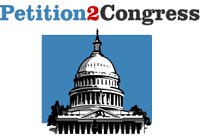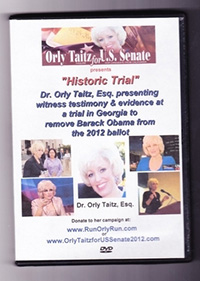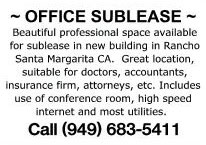Surreply
Posted on | October 1, 2009 | 2 Comments
Holder 1,2Senator SessionsKY secretary of stateAffidavit of Susan DanielsDr. Orly Taitz, Attorney-at-Law
29839 Santa Margarita Parkway, Suite 100
Rancho Santa Margarita CA 92688
Tel.: 949-683-5411; Fax: 949-766-7036
California State Bar No.: 223433
E-Mail: dr_taitz@yahoo.com
UNITED STATES DISTRICT COURT
FOR THE CENTRAL DISTRICT OF CALIFORNIA
Captain Pamela Barnett, et al., §
Plaintiffs, §
§ Civil Action:
v. §
§ SACV09-00082-DOC
Barack Hussein Obama, et al. §
Defendants. §
Plaintiffs’ Sur-Reply: the Ninth Amendment, etc.
In their Reply, Doc. 72, the Defendants first attack Plaintiffs’ response (at p. 1 of their Reply, Case 8:09-cv-00082-DOC-AN, Doc. 72, 09/25/2009, p. 2 of 11) by contending that, “Plaintiffs’ Reliance on the Ninth Amendment is Misplaced.” In support of this assertion, the Defendants cite not one single Supreme Court case, but instead a line of 9th Circuit Cases which goes back, ultimately, not to any text of the constitution itself, but to Lawrence H. Tribe’s 1998 textbook entitled American Constitutional Law[1]. Tribe’s quoted statement concerning the Ninth Rule as a rule of constitutional construction inexcusably contradicts the Supreme Court’s repeated holdings (relevant to the construction of Article II, Sec. 1 qualifications for President, as well as the Ninth Amendment, both of great importance to the resolution of this case) that, “it cannot be presumed that any clause in the constitution is intended to be without effect.” Marbury v. Madison, 5 U.S. 137; 2 L.Ed. 60; 1 Cranch 137, 174 (1803). In interpreting the Constitution, “real effect should be given to all the words it uses.” Myers’ Administratrix v. United States, 272 U.S. 52, 151; 47 S. Ct. 21; 71 L. Ed. 160 (1926)(the Myers case addresses whether Congress may enact legislation withholding the removal power of executive branch officers from other branches of government, see below).
More consistent with the Federalist Papers and Marbury is the theory of the Ninth Amendment advanced by Professor Randy E. Barnett. Barnett takes the position that the Ninth Amendment operates as an active source of rights and cannot be “void where prohibited by law”. Plaintiffs submit that Barnett’s 2004 learned treatise Restoring the Lost Constitution: the Presumption of Liberty, published by the Princeton University Press, is both admissible and susceptible to judicial notice pursuant to FRE 803(18) and Plaintiffs ask this Court to take judicial notice of Barnett’s significant contribution to Ninth Amendment jurisprudence. Accordingly, Plaintiffs incorporate Barnett’s book by reference as if filed as a matter of record as supplemental argument in support of their contentions in this case.
Based on the Ninth Amendment, Barnett proposes to reverse the modern trend by applying a philosophy of judicial review true to its Constitutional origins: a presumption of liberty, which questions every exercise of power. Barnett concedes the need for reasonable restrictions on some actions; for example, when such regulations “are shown to be necessary to prevent the future violation of rights of others.” When a court is faced with a hard case, he feels that in order for the rule of law to be maintained, society must accept the outcome even when the ending is not a “happy” one.
Such exactly is the case of Barnett[2] v. Obama, a hard case whose proper result society must accept even if the ending is not a happy one, at least not for most of Obama’s supporters in the last election. In the present case, the need for reasonable regulation is that which was established in the Constitution, namely that the President must be a “natural born citizen” as that term was interpreted and understood at the time of the adoption of the Constitution, which incorporates Emmerich de Vattel’s “Law of Nations” as one of its own internally extrinsic sources (Article I, §8, https://www.constitution.org/vattel/vattel_01.htm). Plaintiffs also cite and rely upon Vattel’s Law of Nations, at the website cited above, and would both offer it into evidence under Rule 803(18) of the Federal Rules of Evidence, and ask the Court to take Judicial Notice of this ancient treatise as well, on the grounds that the definitions contained therein regarding Natural Born Citizen are those upon which this court must rely in deciding the present case.
Since the Defendants have cited a line of cases originating with a law professor’s textbook, however, there is no reason why Plaintiffs should not equally rely on legal academic texts, and Plaintiffs prefer the writings of Barnett to those of Tribe, and ask this Court to take judicial notice of Randy E. Barnett’s equally learned treatise published in 2004, along with his earlier law review article: “The Ninth Amendment and Constitutional Legitimacy,” 64 Chicago-Kent L. Rev. 37 (1988). The fundamental relevance of Barnett’s treatise on the Ninth Amendment is that where the Constitution creates a rule as clear as the citizenship requirements of Article II, the Court should presume and infer that the Ninth Amendment (taken together with the First Amendment “right to petition for redress of grievances) not merely affords guarantees a remedy belonging to the people and justiciable, and redressable in the courts. Defendants completely fail to address the First Amendment aspect of Plaintiffs’ rights to enforce the constitution, to enforce every clause and provision, including Article II, §1, Clause 5 re: “natural born” citizenship.
Even more significant than Barnett’s work, however, is the vitality of the Ninth Amendment as a key factor in the Supreme Court’s landmark 2008 District of Columbia v. Heller, 128 S.Ct. 2783; 171 L.Ed.2d 637 (2008). While the Ninth Amendment was indeed used in that case as an analogy for rule of construction and interpretation, the Court upheld the independence of the First, Fourth, and Ninth Amendments as sources of independent, individual power by writing: “All three of these instances unambiguously refer to individual rights, not “collective” rights, or rights that may be exercised only through participation in some corporate body.” 128 S.Ct. at 2790, 171 L.Ed.2d at 650.
D.C. v. Heller involves “substantive due process”, because it addresses substantive rights protected by the Constitution, even though the Fifth and Fourteenth Amendments are not precisely cited as central rules of decision in that case. When the Defendants, however, state at p. 1, ll. 22-24, and p. 2, ll. 2-7, that “…the Ninth Amendment does not independently create a constitutional right for purposes of stating a claim” and “the Ninth Amendment is ‘not a source of rights as such’”, the Defendants are ignoring the key role and importance of the Ninth Amendment in modern cases recognizing substantive due process rights starting with Griswold v. Connecticut, 381 U.S. 479; 85 S.Ct. 1678; 14 L.Ed.2d 510 (1965), wherein (according to a search on Lexis) the Ninth Amendment is cited 55 times (see especially the Ninth-Amendment centered concurrence of Justices Goldberg, Harlan, Brennan, and Earl Warren) at 381 U.S. 486, 85 S.Ct. 1682, 14 L.Ed.2d 516).
As is well known, Griswold v. Connecticut stands as the starting point of a very long line of cases, including most notably Stanley v. Illinois, 405 U.S. 645; 92 S.Ct. 1208; 31 L.Ed.2d 551 (1972), Roe v. Wade, 410 U.S. 113; 93 S.Ct. 705; 35 L.Ed.2d 147 (1973); Planned Parenthood v. Casey, 505 U.S. 833; 112 S.Ct. 2791; 120 L.Ed.2d 674 (1992); Troxel v. Granville, 530 U.S. 57; 120 S. Ct. 2054; 147 L. Ed. 2d 49 (2000); and Lawrence v. Texas, 539 U.S. 558; 123 S.Ct. 2472; 156 L.Ed.2d 508 (2003).
In each of these cases (with the sole exception of Lawrence), the Ninth Amendment played a significant if not decisive role in conjunction with the Fifth and Fourteenth to establish a “broad statement[] of the substantive reach of liberty” (Lawrence, 539 U.S. at 564, 123 S.Ct. at 2476) into subjects such as contraception, abortion, sex generally, and family structure in particular regarding which there is no express language in the Constitution whatsoever. How much stronger is the inference that there is an actionable “liberty interest” under the First, Fifth, and Ninth Amendments in the enforcement of the expressly protective clauses of the Constitution e.g. the “natural born citizenship” requirements of Article II, Section 1?
Redressability & Political Questions: Reply page 3, lines 1-3
Defendants further assert that the Plaintiffs have not addressed the question of “redressability” and then they effectively combine this contention with the Political Question Doctrine at page 6 reasoning that, “questions of impeachment or removal from office of a President are political questions because they are textually committed by the Constitution to branches of government other then the judiciary.”
Myers’ Administratrix, cited above, is another “root” case giving rise to a long line of cases, most notably Bowsher v. Synar, 478 U.S. 714, 106 S.Ct. 3181, 92 L.Ed.2d 583 (1986) and Morrison v. Olsen, 487 U.S. 654, 108 S.Ct. 2597, 101 L.Ed.2d 569 (1988). The relevance of these cases, concerning the removal of executive branch officials (all cases relating to officers lower than Cabinet level positions, and none having to do with the express terms of Constitutional eligibility of any particular officer), is—even assuming Defendants were correct that Congress had ever intended to deprive the judiciary of power to adjudicate the Constitutional eligibility of any elected officer—-whether Congress actually possesses the power to limit the removal of any executive branch official to itself by and through the impeachment process. The answer would seem to be a resounding “NO.”
Congress cannot reserve for itself the power of removal of an officer charged with the execution of the laws except by impeachment. To permit the execution of the laws to be vested in an officer answerable only to Congress would, in practical terms, reserve in Congress control over the execution of the laws.
Bowsher v. Synar, 478 U.S. 714, 726, 106 S.Ct. 3181, 3187-88, 92 L.Ed.2d 583, 596 (1986), and Morrison v. Olson, 487 U.S. 654, 685-6; 108 S.Ct. 2597; 101 L.Ed.2d 569, 602 (1988).
The Supreme Court in Morrison took the extra step, relevant to the present case, of evaluating the role of the judiciary in the separation of powers doctrine:
While the Constitution diffuses power the better to secure liberty, it also contemplates that practice will integrate the dispersed powers into a workable government. It enjoins upon its branches separateness but interdependence, autonomy but reciprocity. Youngstown Sheet & Tube Co. v. Sawyer, 343 U.S. 579, 635 (1952) (concurring opinion).
487 U.S. at 694, 108 S.Ct. at 2620-2621, 101 L.Ed.2d at 607.
The Morrison Court’s citation to Youngstown is extremely significant, because Youngstown was a case focusing on Presidential abuse of power and usurpation of authority without recent historical parallel, until approximately January 21, 2009.
In Youngstown, the Supreme Court affirmed the power of a District Court to enjoin unconstitutional usurpation of power (and seizure of property) by the American President Harry S. Truman. Youngstown stands for the proposition that unconstitutional acts on the part of the President can be enjoined by a District Court. So the Plaintiffs’ injuries are judicially redressable: under Youngstown the Court can, at the very least, enjoin President Barack Hussein Obama from acting in the absence of constitutional authority to do so. Under Bowsher and Morrison, the Court can review the President’s qualifications for office and remove him if good cause be shown which would reaffirm the constitutional ethics and standards underlying the legitimacy of the Presidency. Those cases, obviously, concerned the removal of inferior officers, but the logic of separation of powers dictates that ONLY the Article III judiciary, as the final refuge repository of the sovereignty of the people can possibly supervise and review the constitutional qualifications and legitimacy of the President on behalf of the people.
The President cannot be held to be an impartial or dispassionate judge of his own qualifications. In fact, the January 21, 2009, executive order sealing all of President’s archival and personal records, previously submitted in this case, was, like the order seizing steel mills in Youngstown, an order unsupported by any authority deriving either from the Constitution nor any Congressional statute:
The President’s order[3] does not direct that a congressional policy be executed in a manner prescribed by Congress — it directs that a presidential policy be executed in a manner prescribed by the President.
343 U.S. at 588, 72 S.Ct. at 867, 96 L.Ed. at 1168 (1952).
Like the unconstitutional usurpation and exercise of power in Youngstown, Barack Hussein Obama’s usurpation of the Presidency must be condemned for its arrogant disregard of the Constitution.
Again using the insertion of paraphrasis from this critical case in brackets:
It cannot be contended that the President would have had power to issue this [or any] order [or even to assume power at all] had [the Constitution] explicitly negated such authority in formal [language]. [And yet in fact, the Constitution] has expressed its will to withhold this power from the President [because] it [says] so in so many words. The authoritatively expressed purpose of [the Constitution] to disallow such … [a] President [to accede to power]. . . . could not be more decisive . .
Id. at 343 U.S. 602, 72 S.Ct. 893, 96 L.Ed. 1175.
Each and every Plaintiff in this lawsuit is at the very least a taxpayer and a citizen. The expenditure of funds by a President who is not constitutionally qualified is a new requirement imposed on the people of the United States. It is a clear and material change in the terms in the social contract (as well as the actual employment contract of all oath-taking officers and enlisted men and legislators who have sworn to uphold that Constitution) that a President can come into office, seal his records, and disclose nothing about his past or origins once they are challenged.
Accordingly, in response to the Defendants Reply on page 4, ll. 9-17, Plaintiffs can and do allege that the Defendants have imposed upon the Plaintiffs a new, specific, and unconstitutional action that they are required to take in violation of their First Amendment right to petition for proof of constitutional eligibility and their Ninth Amendment reservation of sovereignty, and of the power to uphold the Constitution and see that the laws are faithfully executed by their delegate and trustee, the President of the United States. The point of allowing Flast v. Cohen taxpayer standing is precisely to correct the failures of the political system to abide by the plain letter and strictures of the Constitution. The challenge of what constitutes a “political question” immune from judicial review remains, in Plaintiffs’ eyes, quite simple: non-justiciable political questions are those where a policy choice and decision has been made within the Constitutional framework: e.g., to appropriate and allocate funds for additional nuclear submarines or a new national park. There is no political question involved in whether or not to enforce the First Amendment separation of Church and State, it is strictly a matter of constitutional construction and application. There is no political question involved in whether or not to enforce the natural born citizenship requirements of Article II.
Exhibit A shows a letter from Senator Sessions from Alabama states that the senator cannot get involved in the matter of eligibility due to the fact that the legal actions were pending and ethics requirements prevent him from getting involved in legal matters. Now the government is stating that the judiciary cannot address this issue because it is a political issue and it needs to be resolved by the senators and congressmen, the same senators and congressmen that didn’t want to get involved in the first place because it is up to the judiciary. Absurdity of this argument is clear. As Senator Sessions states his letter- legal matters need to be resolved by the judiciary. Similarly Exhibit B shows quo warranto request filed with the attorney general Eric Holder on March 1. Mr. Holder never responded in the period of seven months.
FREEDOM OF INFORMATION ACT: FORM, FUNCTION, & FUTILITY
In essence, there is a question of material fact regarding the sufficiency of Plaintiffs’ allegations regarding compliance with the pre-requisites for suit under FOIA. Captain Pamela Barnett has fulfilled the requirements in form and function. FOIA is basically a form of inquiry designed to make private party investigations into the Federal government easier and more accessible. More important, however, in light of the executive orders entered on January 21, 2009, all proper FOIA requests, like all other requests were and are FUTILE so long as the President’s executive orders are allowed to stand (see footnote above).
But in practical effect and function, the undersigned counsel’s numerous requests for information, including her letter to U.S.A.G. Eric Holder and the Secretary of State of Kentucky (Exhibit C) constituted massive pre-filing diligence on the part of counsel. Plaintiffs ask the real Congressional purpose in enacting FOIA, to open the doors or narrow the path to information? Plaintiffs contend that they are entitled to use their year of investigations as the practical formal substitute and functional equivalent of a formal FOIA requests originating in Orange County, and that the failure to fill out specific forms should not defeat the right to know.
THE CONSPIRACY TO TAKE THE PRESIDENCY BY FRAUD in 2008
Exhibit D is a new report submitted by Susan Daniels, a private investiga-tor out of Columbus, Ohio, who bolsters the previous investigation of Neal Sankey into the social security number history of Barack Hussein Obama. The falsification of his Social Security number does not in and of itself render Obama unqualified to be President, but it does raise questions concerning his identity. With regard to Hillary Clinton, Michelle Obama and Joseph Biden, the Plaintiffs submit that they still need to amend their Complaint again adequately to state a claim under 18 U.S.C. §1964(c) for racketeering in the 2008 election based, only in part, on multiple instances of predicate act fraud by breach of the intangible right to honest services. Exhibit D makes this more critical.
RHODES v. MACDONALD: MORE BUCK PASSING?
Even though Judge Land dismissed this case, he did so based on a theory of abstention from involvement in internal military matters. Abstention clearly implies that the existence of jurisdiction. Defendants overstate the significance of Judge Land’s highly prejudicial comments. Plaintiffs, naturally disagree that Judge Land lacked authority to construe the significance of the commissioned officer’s oath to uphold the Constitution, and Plaintiffs’ disagree that Judge Land fairly evaluated the international military perils created by an illegitimate commander-in-chief who appears to have obtained his office by fraud. Judge Land, like the Defendants, quite misses the point that all members of the U.S. military are subject to new, specific, and unconstitutional commands because obedience to any command, at the present time, requires violation of their oath to uphold the Constitution. The government under Obama is constitutionally illegitimate, and it is that crisis of legitimacy that “create[s] a virtual engine of destruction of our Constitutional System”, not Plaintiffs’ suit to redress it.
The Defendants’ Motion to Dismiss should be denied in all respects and leave to amend granted.
Respectfully submitted,
Thursday, October 1, 2009
/s/ ORLY TAITZ By:________________________________
Dr. Orly Taitz, Esq., Attorney-at-Law
(California Bar 223433)
Attorney for the Plaintiffs
29839 S. Margarita Pkwy
Rancho Santa Margarita CA 92688
ph. 949-683-5411
Fax: 949-766-7036
E-Mail: dr_taitz@yahoo.com
PROOF OF SERVICE
I the undersigned Charles Edward Lincoln, being over the age of 18 and not a party to this case, so hereby declare under penalty of perjury that on this, Thursday, October 1, 2009, I provided facsimile or electronic copies of the Plaintiffs’ above-and-foregoing Plaintiffs’ Sur-Reply to the following attorneys for the Defendants who have appeared in this case, in accordance with the local rules of the Central District of California, to wit:
THOMAS P. O’BRIEN
LEON W. WEIDMAN
ROGER E. WEST roger.west4@usdoj.gov (designated as lead counsel for President Barack Hussein Obama on August 7, 2009)
DAVID A. DeJUTE David.Dejute@usdoj.gov
GARY KREEP usjf@usjf.net
FACSIMILE (213) 894-7819
DONE AND EXECUTED ON THIS Thursday the 1st day of October, 2009.
/s/ Charles Edward Lincoln, III
Charles Edward Lincoln, III
Tierra Limpia/Deo Vindice
c/o Peyton Yates Freiman
603 Elmwood Place, Suite #6
Austin, Texas 78705
charles.lincoln@rocketmail.com
Tel: (512) 923-1889
Exhibit A:
December 2008
Letter From
Senator Sessions of
Alabama regarding
The need for judicial
resolution
Exhibit B:
Eric Holder
Re: Quo Warranto
[1] The Defendant’s line of Ninth Circuit cases is, however, not at all exhaustive, and excludes earlier holdings from this Circuit such as, “Rights under Ninth Amendment are only those so basic and fundamental and so deeply rooted in our society to be truly “essential rights,” and which nevertheless, cannot find direct support elsewhere in Constitution. United States v Choate (1978, CA9 Cal) 576 F2d 165, 78-2 USTC P 9620, 57 ALR Fed 678, cert den (1978) 439 US 953, 58 L Ed 2d 344, 99 S Ct 350. Plaintiffs contend that the right to limit the Presidency exclusively to “natural born citizens” is one of those that can indeed be described as so deeply rooted in our society as to be an “essential right.”
[2] Plaintiff Captain Pamela Barnett is no known relation to Professor Randy E. Barnett.
[3] Published in the Federal Register: January 26, 2009; Part VIII; The President; Executive Order 13489—Presidential; Records; Executive Order 13490—Ethics Commitments by Executive Branch Personnel Memorandum of January 21, 2009”.
Comments
2 Responses to “Surreply”












 29839 Sta Margarita Pkwy,
29839 Sta Margarita Pkwy, 
 Videography by Barbara Rosenfeld
Videography by Barbara Rosenfeld 


October 1st, 2009 @ 10:07 pm
Great job, Orly. I admire the way you used Senator Session to show how Congress cannot be counted on to handle this and the way you used AG Holder to show how futile quo warranto is, thus focusing on the court as we the people’s last hope for a fair hearing of our grievances.
And you did a beautiful job of turning the Defendants’ own phraseology against them when you said. “The government under Obama is constitutionally illegitimate, and it is that crisis of legitimacy that “create[s] a virtual engine of destruction of our Constitutional System”, not Plaintiffs’ suit to redress it.” Bravo.
October 2nd, 2009 @ 12:46 pm
Congratulations Orly! Now the fun begins… Drill baby drill.